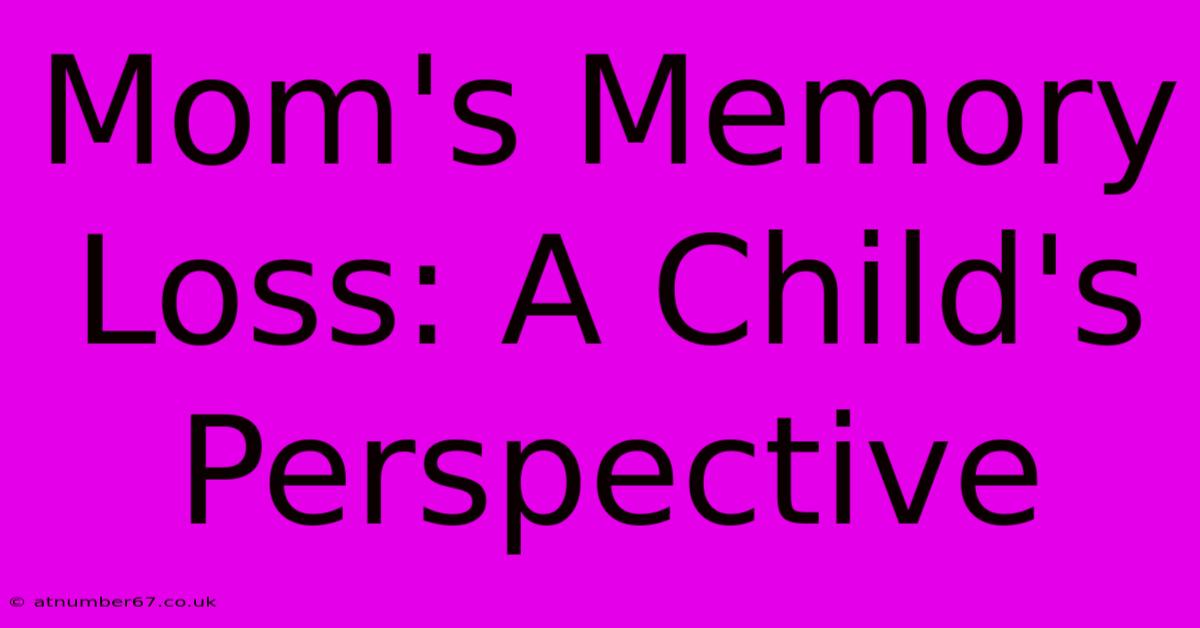Mom's Memory Loss: A Child's Perspective

Table of Contents
Mom's Memory Loss: A Child's Perspective
Watching a parent age is never easy, but witnessing the slow, heartbreaking erosion of a mother's memory due to conditions like Alzheimer's or dementia is uniquely challenging for a child. This isn't just about losing a parent; it's about losing the person who shaped your life, the one who knew your every quirk and held your hand through childhood fears. This article explores the emotional rollercoaster children experience when their mother's memory begins to fade, offering insights and support for navigating this difficult journey.
The Early Signs: A Subtle Shift
The initial signs of memory loss can be subtle, easily dismissed as simple forgetfulness. Perhaps Mom forgets appointments, misplaces her keys more often, or struggles to recall recent conversations. For a child, these changes might seem insignificant at first. However, the cumulative effect can be unsettling, creating a sense of unease and confusion. These early warning signs are crucial to recognize, as early intervention can significantly impact the progression of the disease.
Recognizing the Change: Subtle Clues and Impacts
- Repeated questions: Mom might ask the same question repeatedly, even within minutes.
- Difficulty with familiar tasks: Simple tasks like cooking a meal or managing finances may become challenging.
- Changes in personality: Mom might become more withdrawn, anxious, or irritable.
- Getting lost: Familiar routes might suddenly seem confusing.
- Difficulty remembering names and faces: Even close family members might be forgotten.
These changes aren't just frustrating; they are deeply emotional for a child. It can feel like losing a part of your mother before she's truly gone. The child may feel a sense of responsibility and guilt, even though these feelings are unwarranted.
The Emotional Toll on Children
The emotional impact on children whose mothers are experiencing memory loss is profound and multifaceted. They may grapple with:
Grief and Loss: The Stages of Acceptance
- Denial: Initially, children may refuse to accept the reality of their mother's condition.
- Anger: Frustration and anger are common as the child witnesses their mother's decline.
- Bargaining: Children might try to "fix" the situation, hoping for a miracle cure.
- Depression: A deep sadness can set in as the child processes the loss of their mother's presence.
- Acceptance: This stage involves adapting to the new reality and finding ways to cope.
Understanding these stages is crucial for both children and caregivers. Allowing children to express their feelings without judgment is paramount.
Feelings of Guilt and Responsibility
Children often feel a profound sense of guilt, blaming themselves for their mother's condition. They might also feel overwhelmed by the responsibility of caring for their mother, especially if they are young adults. Open communication and support from family and friends can help alleviate these feelings.
Coping Mechanisms and Support Systems
Navigating this challenging situation requires a strong support system. Here are some coping strategies for children:
Seeking Professional Help: Therapy and Support Groups
Therapy can provide a safe space for children to process their emotions and develop healthy coping mechanisms. Support groups connect children with others experiencing similar situations, fostering a sense of community and shared understanding.
Maintaining a Connection: Adapting to the Changes
Even as Mom's memory fades, maintaining a meaningful connection is crucial. Simple activities like reading together, listening to music, or sharing photos can create cherished moments. Focus on the present and celebrate the moments of connection.
Self-Care for Children and Caregivers
Caring for a parent with memory loss is demanding. Children and caregivers must prioritize their own well-being. This includes engaging in activities that promote relaxation, seeking respite care, and maintaining healthy boundaries.
Conclusion: Embracing the Journey
Witnessing a mother's memory loss is a deeply personal and challenging experience. It requires patience, understanding, and a strong support system. By recognizing the emotional toll on children, providing appropriate support, and focusing on preserving meaningful connections, families can navigate this difficult journey with grace and resilience. Remember, seeking professional help is a sign of strength, not weakness. It’s okay to ask for help and support. This journey is not about what’s lost, but about what remains – the love, memories, and enduring bond between a mother and child.

Thank you for visiting our website wich cover about Mom's Memory Loss: A Child's Perspective. We hope the information provided has been useful to you. Feel free to contact us if you have any questions or need further assistance. See you next time and dont miss to bookmark.
Featured Posts
-
Saif Ali Khans Sons Age A Turning Point In His Life
Apr 04, 2025
-
The Ultimate Guide To Spanish Tongue Twisters For Beginners
Apr 04, 2025
-
Is Charles Mansons Son Alive The Puzzling Case
Apr 04, 2025
-
Gene Simmons Net Worth Is He Overrated
Apr 04, 2025
-
The Controversial Age Of Consent In Albania
Apr 04, 2025
